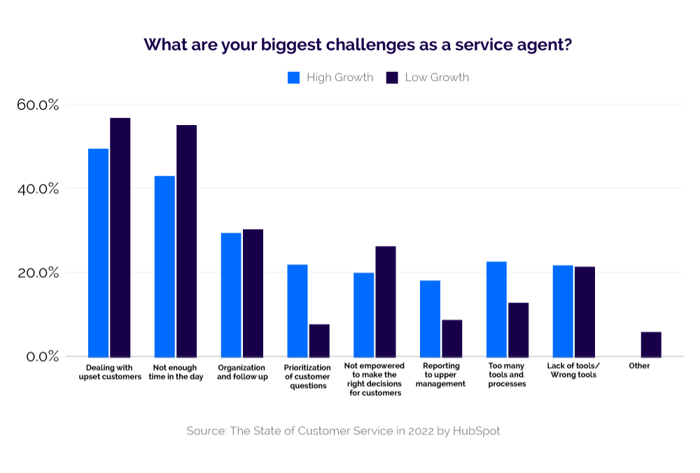Between financial constraints, upticks in turnover, and an ever-increasing docket of IT projects, help desks are being asked to do more with less … and less.
In these situations, help desk teams adapt the best they can, typically by triaging customer calls or referring them to higher tiers of support. They may also try to hurry calls along to keep up with the volume. These strategies may make sense in the moment, but ultimately, they all take a toll.
Unfortunately, that price is paid by your customers. Here’s how.
1. Worn-out Agents Lead to Customer Frustration
One of the main reasons customers walk away from your organization is because they feel you don’t care about them anymore. When a customer has issues that need to be addressed, they want to know the help desk team is there to support them.
But when your team is overworked, issues take longer to resolve. Customers experience longer wait times, and fatigued help desk staff may forget to follow back up.
Click to enlarge
These inconsistent services may drive your customers to look for support elsewhere, whether online or by asking their colleagues. (And the advice they receive may only lead to more problems.)
 Fatigue can also lead to poor decision-making on the part of your help desk team. They may misjudge the severity of a customer’s problem or escalate the ticket too quickly. In some cases, overworked staff may struggle with their soft skills, resulting in less pleasant – if not downright curt – treatment of customers.
Fatigue can also lead to poor decision-making on the part of your help desk team. They may misjudge the severity of a customer’s problem or escalate the ticket too quickly. In some cases, overworked staff may struggle with their soft skills, resulting in less pleasant – if not downright curt – treatment of customers.
The solution? First, review your processes. Do you have consistent, documented practices in place to unsure your team easily keeps on track of tickets? If you don't, implementing such practices can be a big help. But if you've be already got good processes in place, it may be time to look for ways to supplement your team with additional help.
2. Your Customers Receive Less Support for Other IT Projects
Chances are, your customers rely on you for more than help desk support. When there’s a software rollout, migration, or other IT project, customers rely on your team to ensure these projects succeed.
Unfortunately, an overworked help desk means a lack of available IT staff in general.
When your help desk is overwhelmed with requests, they reassign tickets to any and everyone. Suddenly all those highly skilled, highly paid professionals in your IT department are too busy handling Tier 1 support requests to tackle the larger strategic projects your customer wants to get done.
And the domino effect just continues. Once your IT team becomes overwhelmed, maintenance can also fall by the wayside. If this goes on for too long, it can leave your customer vulnerable to crashes, work stoppages, and cybersecurity risks. It’s a dangerous situation that can have serious consequences for you and the people you serve.
The solution? Sometimes cases like this are caused by a single project, like a software rollout that results in a sudden influx of support tickets. Other times, it’s due to an ongoing problem with staffing. In either instance, the best thing to do is bring in more help desk support to take the pressure off your IT department.
3. Your Customers Stop Trusting You for Support
An overworked help desk means frustrated customers. And we mentioned earlier that frustrated customers may seek out other sources of help.
There’s a name for this phenomenon – “shadow IT” or “underground support” – and it can actually be very dangerous:
- Problems and vulnerabilities may go undetected, as your customers adopt unapproved workarounds or unsupported applications as a short-term solution.
- Your own metrics become unreliable, too. You may see a drop in call volume that would seem to suggest your customers need less support, when in fact, the exact opposite is really the case.
- You’ll also lose insight into the pain points and issues your customer is actually experiencing.
- Finally, there’s the issue of compliance. If your customers are turning to unapproved solutions, they may inadvertently violate regulatory legislation – a mistake that could prove very costly.
The solution? Even in the best of times, you should be vigilant about any hint that your customers are relying on underground support. But if it’s happening because your help desk team is overworked, it’s time to bring in more help.
4. How to Avoid Helpdesk Burnout
When overworked employees suffer from burnout, the effects can cascade throughout your organization. They can also be felt by the people you serve. Whether your customers experience it as frustration, a lack of support, or as the impetus to seek answers elsewhere, it puts a serious strain on your relationship.
If this situation sounds a little too familiar, it’s time to bring in some help. Speak with our team of help desk experts today, and give your team the support they need.



